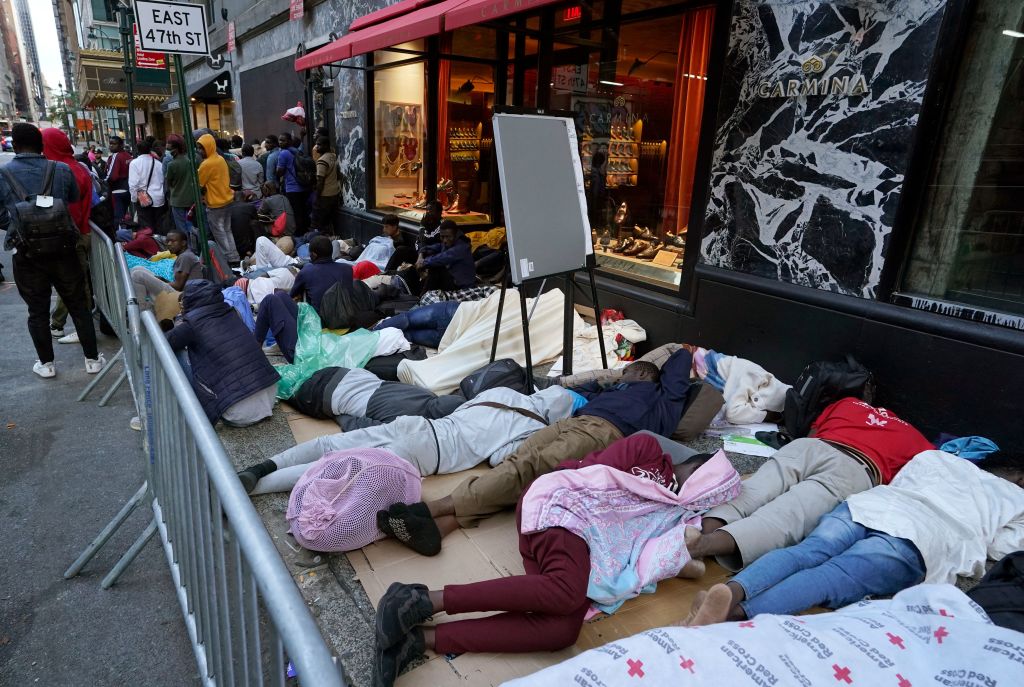New York City's escalating migrant crisis
After many months of migrant arrivals, the Big Apple has reached a breaking point


A free daily email with the biggest news stories of the day – and the best features from TheWeek.com
You are now subscribed
Your newsletter sign-up was successful
At the end of July, New York City Mayor Eric Adams issued a blunt warning about the city's ongoing migrant crisis. "Our next phase of this strategy, now that we have run out of room, we have to figure out how we're going to localize the inevitable that there's no more room indoors," he said during a violence prevention task force meeting in conjunction with Governor Kathy Hochul (D) and other city and state officials. The comments notably arrived after The Roosevelt Hotel, where many migrants are being housed, reached full capacity, and incoming hopefuls were left stranded outside on the street in the heat. "We need to call a state of emergency, and we need to properly fund this national crisis," the mayor said, noting that his administration will soon be starting the "next phase of our operation."
How did so many migrants end up in NYC?
New York has always been a city of newcomers, in part a reflection of its ethos as a sanctuary city but also due to a legal obligation to offer shelter to anyone that wants it, setting it apart from other urban areas like Chicago or Washington, D.C. First enacted in 1981, the right-to-shelter mandate arrived in the wake of a 1979 class-action lawsuit against the city, wherein a homeless man named Robert Callahan served as a plaintiff on behalf of homeless people facing overcrowding in shelters, per Bloomberg. Since then, several city administrations have attempted — and failed — to squash the rule.
The impetus of the current crisis is also political, largely because of pushback from Texas Gov. Greg Abbott (R). In protest of what he sees as lax federal policies at the U.S.-Mexico border, Abbott has bussed migrants out of Texas towns and into larger, more liberal northern cities like Chicago, D.C. and New York City.
The Week
Escape your echo chamber. Get the facts behind the news, plus analysis from multiple perspectives.

Sign up for The Week's Free Newsletters
From our morning news briefing to a weekly Good News Newsletter, get the best of The Week delivered directly to your inbox.
From our morning news briefing to a weekly Good News Newsletter, get the best of The Week delivered directly to your inbox.
How many have arrived?
According to the mayor's office, almost 100,000 migrants have arrived since last spring. The city has "opened 194 sites, including 14 humanitarian release centers," for these asylum seekers, and more than 1,300 asylum applications have been "submitted since the city launched a health center in June," per Axios. "We get 2,300 people a week," Anne Williams-Isom, the deputy mayor for Health and Human Services, said during an early August briefing. "I can only speak to what we are doing in New York City. We are giving our blood, sweat and tears into this, doing the best that we can. I can't speak to the federal government." The city estimates that the migrant influx will cost it more than $4 billion over two years.
What does 'no more room' really mean?
At the end of July, New York had enough beds to fulfill its right-to-shelter obligation. But at some point in the ensuing days, "that stopped being the case," the Times reported. "There is no more room," Adams said at the time. "From this moment on, it's downhill."
Migrants were soon stuck in lines outside The Roosevelt Hotel in Midtown, sleeping on sidewalks in extreme heat, while the 194 other relief locations were also allegedly at capacity. Most of the migrants were later cleared from the sidewalk near the hotel, but the overarching problem nonetheless remains.
What's being done?
"Everything is on the table" as the city searches for more room, said Williams-Isom. A new relief center capable of serving 2,000 adults will soon open on Randall's Island, and two others are set to open in the coming weeks. (A temporary facility opened and closed on Randall's Island last year.) Officials have also announced plans to "convert a long-abandoned psychiatric care facility in Queens into a humanitarian relief center," per Bloomberg.
A free daily email with the biggest news stories of the day – and the best features from TheWeek.com
"It's not that there's no spaces, it's that the spaces we have are encumbered by bureaucratic barriers that make it time-consuming and difficult to get people into them," Catherine Trapani, the executive director of nonprofit coalition Homeless Services United, told the Times. There are also likely spots in which the city could set up temporary beds, such as school gyms, but they aren't venues officials could "use on an ongoing basis," added Joshua Goldfein, an attorney with the Legal Aid Society. Still, "if you just brought people inside, gave them a place that is not exposed to the weather … that would be better."
Meanwhile, Adams has sought to discourage migrants from attempting the journey to New York with a plan to distribute flyers at the southern border. The papers, which suggest asylum seekers "consider another city," are meant to "combat misinformation at the border," his office said. The mayor has also asked a judge to suspend the right-to-shelter order.
Is the federal government involved?
Adams has voiced complaints that the Biden administration has not sent enough financial aid or acted on "requests like expedited work authorization," Politico reported, which would allow migrants to quickly obtain jobs, move out of shelters and travel elsewhere in the country. "There were bordering states that received more money than us, and they're using the money to bus people to New York," the mayor said at a recent news conference, claiming NYC has received just $30 million in federal aid, despite state congressional leaders announcing in June that the city would receive almost $105 million in FEMA funds to address the problem.
"No one wants anyone sleeping on the street or being used as a pawn in a political fight, but it's just plain reality that there's no more room," a City Hall adviser told Politico. "And week after week, the pressure is going to keep mounting on Washington to do something now or wait for it to impact the 2024 elections."
Brigid Kennedy worked at The Week from 2021 to 2023 as a staff writer, junior editor and then story editor, with an interest in U.S. politics, the economy and the music industry.
-
 6 of the world’s most accessible destinations
6 of the world’s most accessible destinationsThe Week Recommends Experience all of Berlin, Singapore and Sydney
-
 How the FCC’s ‘equal time’ rule works
How the FCC’s ‘equal time’ rule worksIn the Spotlight The law is at the heart of the Colbert-CBS conflict
-
 What is the endgame in the DHS shutdown?
What is the endgame in the DHS shutdown?Today’s Big Question Democrats want to rein in ICE’s immigration crackdown
-
 ICE eyes new targets post-Minnesota retreat
ICE eyes new targets post-Minnesota retreatIn the Spotlight Several cities are reportedly on ICE’s list for immigration crackdowns
-
 How did ‘wine moms’ become the face of anti-ICE protests?
How did ‘wine moms’ become the face of anti-ICE protests?Today’s Big Question Women lead the resistance to Trump’s deportations
-
 The UK expands its Hong Kong visa scheme
The UK expands its Hong Kong visa schemeThe Explainer Around 26,000 additional arrivals expected in the UK as government widens eligibility in response to crackdown on rights in former colony
-
 How are Democrats trying to reform ICE?
How are Democrats trying to reform ICE?Today’s Big Question Democratic leadership has put forth several demands for the agency
-
 Minnesota’s legal system buckles under Trump’s ICE surge
Minnesota’s legal system buckles under Trump’s ICE surgeIN THE SPOTLIGHT Mass arrests and chaotic administration have pushed Twin Cities courts to the brink as lawyers and judges alike struggle to keep pace with ICE’s activity
-
 700 ICE agents exit Twin Cities amid legal chaos
700 ICE agents exit Twin Cities amid legal chaosSpeed Read More than 2,000 agents remain in the region
-
 House ends brief shutdown, tees up ICE showdown
House ends brief shutdown, tees up ICE showdownSpeed Read Numerous Democrats joined most Republicans in voting yes
-
 A running list of everything Donald Trump’s administration, including the president, has said about his health
A running list of everything Donald Trump’s administration, including the president, has said about his healthIn Depth Some in the White House have claimed Trump has near-superhuman abilities
